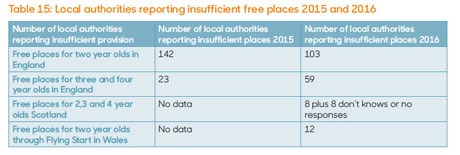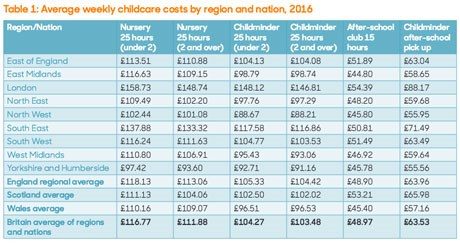Family and Childcare Trust Survey: shortage of places puts 30-hour childcare in doubt
Wednesday, February 24, 2016
More than a third of local authorities in England say they do not have enough childcare places for three- and four-year-olds, putting the Government’s plan to offer 30 hours of free childcare in jeopardy, a major report warns.

The Family and Childcare Trust's 2016 Childcare Survey finds that local authorities are reporting that there are not enough free places in some areas for the current 15-hour entitlement, and that gaps in provision are growing.
Last year 41,300 three-year-olds did not receive any free early education, the survey reveals.
Fifty-nine local authorities say that they do not have enough places for three- and four-year-olds in their area, up from 23 in 2015.
‘In some areas there are simply not enough nursery and pre-school places available,’ the report said.

In areas where there are enough places, uptake of them is higher at 95.4 per cent of eligible children, compared to 91.9 per cent where there are gaps in provision, the report found.
Other reasons put forward for low uptake were parents not knowing or being confused about their entitlement, or feeling that their children are too young for nursery.
For the first time the annual survey – now in its 15th year- has also calculated the number of childminders per 1,000 children under five in each area.
This reveals big differences across the country, with, for example, four childminders per 1,000 under-fives in Hull, compared to 24 per 1,000 in Bromley. There are ten local authorities in England where there are five or fewer childminders per 1,000 children.
Childminders will be crucial to the delivery of the 30 hours in 2017, the report says.
There are also ‘chronic gaps in childcare’ for school-aged children, disabled children, and families in rural areas, the report said.
Only 15 per cent of councils in England said they had enough childcare for disabled children, down from 21 per cent last year. Just nine per cent of local authorities said they had enough after-school childcare.
The survey was sent to all local authority Family Information Services in England and Wales and their Scottish equivalent, Children’s Information Services, and is based on responses from 197 of 206 local authorities in Britain.
Costs
However, costs for childcare have stabilised. The report found that costs across the country have broadly risen in line with inflation, for the first time in eight years. However in London, costs are on average a third higher than elsewhere in the country.
A part-time nursery place (25 hours) for a child under two rose by 1.1 per cent last year, and is now on average £116.77 a week in Britain. But in London, the cost for the same childcare is up by 2.2 per cent, to £158.73 a week.

The report also highlights the plight of families dependent on Working Tax Credit, where in 11 local authorities the average cost for part-time childcare exceeds the cap, meaning that the poorest working parents have to pay an average of £81.53 a week, or £4,240 a year themselves.
Julia Margo, chief executive at the Family and Childcare Trust, said, ‘Parents will breathe a sigh of relief that childcare costs have only risen in line with inflation over the last year.
‘But we are very concerned that thousands of three year olds are missing out on existing entitlements before the expanded 30 hours of free childcare is even piloted. Extra free childcare is of no use to working parents if they can’t find a place for their child. To make childcare really work for parents, we want to see the right to an early education place brought in line with the right to a school place.’
Commenting on the survey findings, education and childcare minister Sam Gyimah said that free childcare places were on offer through more providers.
‘It is vital parents are able to access high, quality affordable childcare and this report shows there is record support available. For the first time in a decade costs are stabilising and there are rising numbers of places on offer,' he said.
‘Latest figures show 7,000 more providers are offering the universal 15 hours offer with 1.3million children - the vast majority taking it up. Rising numbers of disadvantaged two-year-olds are also benefiting.
‘Thanks to record investment by this Government - £6billion a year by 2020 – and with our plan to double the free childcare offer for working parents we expect take-up numbers to rise. That ambition is supported by the huge levels of interest in our early implementers scheme which will trial the 30 hour offer a year ahead of schedule in parts of the country with nearly 100 local authorities and 1,700 providers all asking to take part.’
The Department for Education said that around 650,000 three-year-olds and 675,000 four-year-olds currently receive funded early education - a total of over 1.3 million.
Around 157,000 of two-year-olds are benefitting from a funded early education place, based on figures from last June.
Sector response: ‘Working together’
‘This reported reduction in provision could be resolved by using up capacity in private and voluntary nurseries. According to our own survey published last week, average nursery occupancy is at 72 per cent. Therefore there is sufficient capacity within nurseries which could be used for funded places if providers’ costs were covered by Government fees.’
‘Now we hear that more local authorities are already reporting reduced availability for three and four-year-old places of the existing 15-hour entitlement.
‘Nurseries are keen to offer more funded places, but need to know the funding given through local authorities will cover their delivery costs, so they can maintain high-quality early education and make sure their settings are sustainable.
‘All types of childcare provision need to work together to make sure funded childcare works for families. It’s vital we make sure the 30 hours pilots from September test a variety of funding solutions to make sure that the full roll-out in 2017 can take place.’
Purnima Tanuku, chief executive, National Day Nurseries Association
'The lack of available free education places for children is of great concern. Local authorities are not meeting demand, and so children are missing out.
'We are acutely aware that the number of childminders has fallen in recent years. However, it is time to stop lamenting the decline in childminders and instead focus on how settings can work together to deliver the free education entitlement. Childminding has a key role to play in delivering the 30 hours offer - and capacity to do so as long as the funding structure local authorities put in place is right.
'Childminding is changing with settings growing capacity by taking on childminding assistants and there has been a steady increase in childcare on domestic premises. There is a new era for childminding ahead and for the unique home-based service that they offer families.'
Liz Bayram, PACEY's chief executive
‘We warmly welcome the news that childcare costs have risen in line with inflation, a clear reflection of the sector's commitment to deliver quality but affordable childcare to families despite the financial pressures they themselves continue to face.
‘It is, however, extremely concerning that local councils are increasingly struggling to provide sufficient funded places. This is a problem that will only worsen with the roll-out of the 30-hour scheme – many providers have warned that they simply will not be able to deliver the extended scheme, not only due to lack of funding, but also a lack of available places.
‘As such, while we welcome the recent promise of increased investment into the sector, the problem of insufficient capacity is one that the government simply cannot continue to dismiss. Parents were promised quality, affordable, accessible childcare – the Government must work with, not against, the sector if it is to deliver on this promise.’
‘Childminders are a vital source of quality, flexible childcare and will be integral to the success of the 30-hour scheme; and yet, a continued lack of support – both financial and practical - has meant that they are continuing to leave the sector in droves.
‘Rather than wasting time and resources on its failed childminder agency policy, the government should look to start engaging properly with childminders, and recognising the pivotal role they play in the provision of quality care and education, to ensure that this trend does not continue.’
Neil Leitch, chief executive of the Pre-school Learning Alliance
‘The report confirms what many families have told us. The estimated cost of almost £8,000 for part time childcare for two children is prohibitive and leads to many parents questioning the viability of work. Families are working longer hours and struggling to make ends meet. On top of this, the availability and affordability of childcare is putting them under immense pressure, with many feeling like just one unexpected increase could push them over the edge financially.’
Imelda Redmond, chief executive of 4Children
'The report highlights two things we already know.
'Free childcare places for three and four year olds sounds good as a headline. But in fact it’s fundamentally flawed. It’s under-funded, hated by providers and doesn’t help mothers back to work. No surprise to see it failing everywhere
'And, equally no surprise to see childcare costs finally falling into line with inflation. The childcare market is indeed a market where supply and demand will eventually meet – just about five years more slowly than in efficient markets. There is plenty of supply out there especially amongst childminders, and home childcarers (who include nannies, babysitters and lots of nice grandparents). So good news to see prices finally subsidising even if it’s a bad time to be an owner of expensive, newly refurbished nurseries.'
Childcare expert, Ben Black, director of My Family Care, Tinies (the nanny agency), Emergencychildcare.co.uk and Nannyshare.co.uk
'Many childcare providers don't offer the free 15 hours a week childcare because it isn't financially sustainable. Providers often insist that parents use a minimum of 20-plus hours a week to cross-subsidise the underfunding of the free entitlement. It's therefore not surprising that many parents are struggling to find free childcare places.
'Parents tell the Good Care Guide that the cost of childcare is still their biggest concern. As a result children are missing out on early education and parents are sometimes being forced to pay for childcare they don't need.
'This does not bode well for the implementation of the Government's plans to extend the free childcare entitlement to thirty hours per week. Without proper funding, this much needed expansion of childcare is doomed to fail.'
Stephen Burke, director of Good Care Guide
'The fact that the number of councils in England with sufficient childcare for children with special education needs is less than was the case last year should act as a wake-up call for all of us. The Family and Childcare Trust’s report shows that not only are the numbers down from last year, but many childcare providers are frustrated because they are under-confident in providing the quality of support these children need.
'At I CAN we know that speech, language and communication needs is the most prevalent special education need in children. They require support as early as possible and yet many of these children go unidentified.
'There is an urgent need to address the gaps in access to care for children with special educational needs. This will require investment in training and equipping the early years work force with tried and tested programmes which deliver the best results for children.'
Bob Reitemeier
Chief Executive, I CAN




